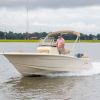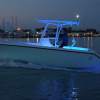
10 Things You Should Never Do Without in Your New RV
So, you’ve decided to take the proverbial plunge and are excited about buying your first RV. Now, you’ve got to figure out everything you’ll need to stay safe and comfortable on the road. Some items, such as a first aid kit and hook-up tools, are obvious. Others, not so much. In the interest of happy camping for all, we are pleased to present the following list of 10 things you should never be without:
1. Black tank treatment

One thing that makes RV life so convenient is also one of the most bothersome to deal with. We’re talking about the black tank that collects waste from your toilet. Fortunately, an effective black tank treatment plan goes a long way toward preventing a stinky situation.
Glamper Life recommends treating your tank with Camco drop-in chemical packs. Available in orange, lavender, hibiscus, and other scents, formaldehyde-free Camco packs eliminate odors for up to a week while lubricating holding tank sensors.
2. Dehumidifier
Even the tidiest RV can get smelly due to the presence of airborne moisture. A disposable DampRid dehumidifier physically traps excess moisture and prevents that not-so-fresh musty smell. Made with activated charcoal, each dehumidifier eliminates odors in a 300-square-foot area and lasts for around two months.
3. Dedicated drinking water hose
Shop carefully to ensure your new hose is explicitly made for drinking water. Those green hoses found at Walmart and other big box stores often contain lead, warns Glamper Life. The site goes on to say that outfitting your new RV with two or three shorter water hoses makes more sense than having one super-long hose.
4. Leveling blocks
If you’ve ever tried to sleep in a camper on uneven ground, you’ll be glad to keep several leveling blocks on hand. Typically available in packs of 10, interlocking leveling blocks make it easy to stabilize your recreational vehicle on less-than-level terrain.
5. Sewer hose and supports
Even if you’re trying to save money while outfitting your new motorhome, spend whatever it takes to obtain a high-quality sewer hose. Look for a hose with a range of threaded adapters to fit 3″, 3.5″, and 4″ dump station pipes.
Additionally, campsites are generally flat and don’t offer much in the way of gravity assistance when emptying an RV sewer tank. An all-plastic sewer hose supporter boosts drainage while keeping the hose off the ground.
6. Stabilizer jack pads
Distribute the weight of your RV evenly and prevent the jacks from sinking into the ground with stabilizer jack pads. Look for pads made of UV-stable resin, and remember to use them flat side down with trailer tongues, stack jacks, swing arm supports, and 5th wheel jacks.
7. Toter tank
If you happen to set up camp at a site where there is no sewer connection, you’ll be doubly glad you brought a toter tank along. With it, you will be able to empty your waste water without driving your rig to the dump station. Look for a low-to-the-ground toter with a conventional waste valve that eliminates the need to lift the tote for emptying.
8. Water pressure regulator
Inconsistent water pressure won’t be a problem if you install a water pressure regulator in your new RV. Small and simple, a regulator placed between the water hose and your RV prevents sudden changes in campground water pressure from damaging the plastic pipes that run throughout your rig.
9. Weight distributing anti-sway hitch
Some have built-in controls, and some can be accessorized with aftermarket sway control. Either way, a weight-distributing hitch that limits side-to-side sway is imperative to safe RV motoring. Such a device makes for better braking and improved handling, too.
10. Wheel chocks
A minimum of two chocks is required to prevent your parked rig from rolling away. Placed in pairs with one in front and one in back of a tire, wheel chocks provide a sense of stability in your home-away-from-home.
It wasn’t long ago that new RV owners had to learn by trial and error. Today, helpful hints provided by Glamper Life and other experts take the guesswork out of setting up a brand-new rig.


